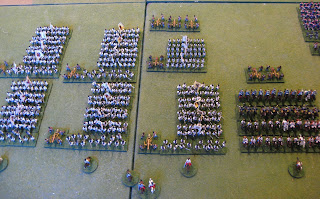15mm Second Italian War of Independence Project
While working towards a project goal, it is useful to occasionally take stock of progress on a visual basis. Having an order of battle as a project guide and logging completed units into a database may be sufficient but may not be complete. For completeness, I may decide to pull all units out of their boxes and deploy the troops onto the table just to confirm progress made. My 1859 project has reached this point of needing to gauge completeness.
Setting up the figures on the table top shows the relative strengths of the combatants. Since the project, thus far, has been focused on the San Martino battle, few French have been completed.
By my count, there are 605 Austrians with 11 guns, 348 Sardinians with 6 guns, and 134 French with 2 guns. Austrian FML Benedek's 8th Corps is virtually complete with two Sardinian divisions not far from finished. By adding five battalions of Austrian infantry in November, Italian infantry should be the next painting focus. Stands are organized at the battalion level with figures grouped and based into battalions, squadrons, and batteries with each figure representing 50 men.
A more detailed snapshot for each of the combatants is illustrated below.
 |
| Sardinians |
 |
| Austrians |
 |
| French |
As painting totals near the San Martino goal, it really is time to begin seriously considering rules for gaming the battle. Since the maneuver unit (MU) is at the battalion level and I prefer whole stand removal my thoughts are pointed towards Field of Honor, Thomas' 19th Century rules, Weigle's 1859, or a derivative of my standard combat effectiveness model. Perhaps, I'll consider bits of all three and see what surfaces.




Your project is both beautiful and impressive in size! You should be very proud.
ReplyDeleteAnd I must say you're a little bit daring to paint up whole armies without having set on rules.
:-)
Monty, I have no fear of rebasing. The first time may be painful but after you've rebased an entire project a time or two, you hardly feel it.
ReplyDeleteBesides, I have my notion for how a unit/game should look on the table. Once I have that figured out, then the rules can be tortured in to conforming, if need be.
Thanks for your comments.
Interesting. Can I ask, what do you use to put your figures down with? I used a liberal amount of wood glue and it's a bear to rebase. I'm now trying basing with a hot glue gun. It's promising but figures come up a little too easily. I may be doing it all wrong!
DeleteFigures affixed to a base with wood glue are indeed a bear to remove. There was a time when I used wood glue and I probably still have a few scars from prying figures off the base with a knife.
DeleteNow, I use Elmer's glue. With white glue, the figures stay stuck yet with a soak in water, the figures are easily removed from their base. Also, the figures aren't damaged during the rebasing process from a slip of the knife. I've never tried using hot glue.
Your Elmer's glue suggestion is a great one. I soaked the rest of my Samurai stands in warm water after our last game and they released without me carving my hand up again.
DeleteThanks for all of the info and great pics of the Italian War of Independence. You have inspired me to get into this period. I presently have large miniature armies for the Franco-Prussian War (mostly OldGlory15s) and am now in the process of painting up Austrians to fight my French on the wargame table. May throw in some Italians as well. I use a modified version of Regimental Fire & Fury rules (written for ACW) which allow me to recreate fighting at the small unit battalion level.
ReplyDeleteThank you for dropping by, Don! Pleased that my project can provide motivation for your own project. My 1859 project has grown since this summary so take a look at more recent postings to see what else has crossed my painting desk.
DeleteOld Glory 15s' Austrians are really nicely sculpted and a joy to paint. Their Italians are equally good. I need to work on fielding French for my project.
I would enjoy seeing your project!